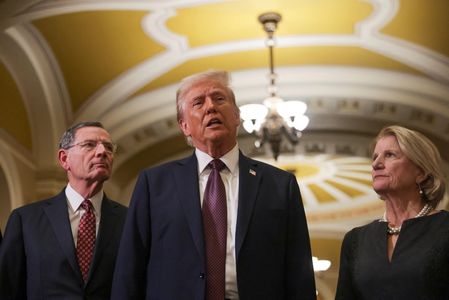Confirmation hearings will begin next week for some of Trump’s nominees. It comes just as Trump has threatened allies and friends from Denmark to Panama, giving new meaning to “America First.” The panel discusses why he's making these comments and if the nominees will face easy confirmations.
Clip: Trump’s threats against allies give new meaning to 'America First'
Jan. 10, 2025 AT 8:38 p.m. EST
TRANSCRIPT
Notice: Transcripts are machine and human generated and lightly edited for accuracy. They may contain errors.
Jeffrey Goldberg: I want to pivot to the most important geopolitical issue of the moment, which is the future of Greenland, obviously. And, you know, the president-elect has spent a lot of time in the last week or two trolling or criticizing some allies and friends, including Canada, Panama, and Denmark, obviously, the ruler, the sovereign over Greenland, which Donald Trump has made very clear he wants to buy on behalf of the United States.
Tom, allow me to quote from a famous play set in Denmark. Though this be madness, yet there is method in it. So, is there method to this? Is there something that we're not understanding or is this just Donald Trump having some fun?
Tom Nichols: Well, some of it's always Donald Trump just having some fun, doing it because he, to quote another famous work of literature, the turn of the screw, the young boy in it who says, why do you do these terrible things? He says, because I can. But I also think there is a little bit of strategy. Because think about all the -- I mean, we're talking about things that are never going to happen, right? We're not going to war with Denmark over Greenland. We're not going to seize the Panama Canal. We're not talking about the fact that Pete Hegseth is going to the Hill next week. We're not talking about Tulsi Gabbard. We're not talking about RFK.
I mean, this whole strange foreign policy fandango has kind of obliterated a lot of other discussions that I think were really --
Jeffrey Goldberg: Is that purposeful?
Tom Nichols: You know, I'm always worried about ascribing too much purpose Donald Trump at any given moment. But it could be --
Laura Barrón-López: I think it is. I mean, some people who have worked for him said that he does -- say that he does this on purpose. If he feels as though the press is not paying attention to him or paying attention to something that he wants, if he's bored by the news cycle, he jumps in and he tries to seize control of it. And that's what he did this week, when everyone was focused on Jimmy Carter's funeral, when people were preparing for the sentencing today in the New York hush money trial and potentially covering that. He goes out there and says, I may use military force against Greenland and the Panama Canal. And what happens? The press jumps in response to it.
Vivian Salama: He's the master of distraction.
Jeffrey Goldberg: Vivian, let me ask you this. Tom is sure that we're not invading Denmark or Panama. Are we 100 percent sure that this is just for fun or is there a chance that NATO has to sit there and go, wait, what do we do if he is somehow aggressive against Greenland?
Vivian Salama: Donald Trump is so unpredictable that NATO is already doing that, just to be clear. They're already asking those questions. But does anyone on his staff that I've talked to think that he's actually going to invade Greenland or invade Canada or try to forcefully take the Panama Canal? No, but he is going to use very aggressive, coercive behavior, threaten economic tariffs if he can and otherwise just to get his way. He does not like to be told no.
And that's what's happened here, is that in every one of these cases, he's been told no, you cannot have it. And that is making him want it even more and get more aggressive with his rhetoric. But there is some national security strategy behind this. And we've been talking about this since '16 -- I mean, since '19, when the story broke, is that, you know, they want Western Hemisphere dominance. This is an old Republican obsession about Western Hemisphere dominance and fortifying us positions in the Arctic across the Western Hemisphere.
And so this is --
Jeffrey Goldberg: These are legitimate issues that American national security --
Vivian Salama: They're legitimate issues that have unfortunately gotten, you know, conflated with sort of the blurry rhetoric of Donald Trump talking about buying Greenland and invading Panama,
Jeffrey Goldberg: Right?
Carl Hulse: I'm not 100 percent convinced about Panama, you know, that it is something. The interesting thing to me is what the reaction is on the Hill, you know? In the House, it's pretty rah-rah, let's do what we have to do, you know, this is okay with us. In the Senate it's a little more, we're not sure exactly what this is about.
Laura Barrón-López: The reaction from foreign leaders is interesting though, and I think a little different than what it was potentially his first term, which is that there's a bit more mocking of Donald Trump.
Jeffrey Goldberg: Yes.
Laura Barrón-López: Mexico's president was mocking him. Canadian lawmakers were mocking him.
Jeffrey Goldberg: Yes, that's good domestic politics.
Yes, I want to note for the record that Vivian is the person who broke the Greenland story in 2019, so just noting, wonderful report.
Vivian Salama: This will be written on my tombstone.
Jeffrey Goldberg: Yes, you broke the Greenland story.
You mentioned Pete Hegseth, we have a few minutes, I want to talk about these nominations next week. Carl, give us the state of play.
Carl Hulse: I mean, the nominations start in force on Tuesday. Pete Hegseth is going to have an extremely difficult hearing. The Democrats are loaded for bed, but they're not loaded as they want to be because they haven't seen all the documents that they want to see. That's what the fight is on the Hill right now. Are we going to see these documents?
I think how some of these other -- you know, there's going to be some that go extremely smoothly and you'll hardly notice them. But, you know, the high-profile ones are Pete Hegseth and Tulsi Gabbard, who we have not gotten to.
Jeffrey Goldberg: Yes. And it's your belief that Gabbard has problems?
Carl Hulse: I think she does have a problem. The Trump folks might want to upend the intelligence community of the United States. Senate Republicans don't want to do that. And certainly Republicans on the intelligence committee, including -- and I include Mitch McConnell.
Jeffrey Goldberg: Well, I wanted to ask you -- you're a McConnellologist. I'm going to beat this one to death. Yes, I'm just killing it. But that's one of the biggest questions of all here, is how much does Mitch McConnell stray from the Orthodox pro-Trump line in the coming weeks.
Carl Hulse: I don't think he's going to have problems doing that. And I think --
Jeffrey Goldberg: He's a free man.
Carl Hulse: -- if you look at Mitch McConnell, and you look at Tulsi Gabbard, right, she's had to turn around her criticism of one of the national security programs, and eavesdropping one. She's going to be questioned about why she wanted to pardon Edward Snowden. I think, you know, some of the things that she's advocated and done are just so contrary to what Republicans in the Senate are about when it comes to intelligence.
Jeffrey Goldberg: Vivian, what does it mean if Tulsa Gabbard becomes the director of National Intelligence?
Vivian Salama: So, there are -- I mean, the job is to oversee the intel community at large and sort of, kind of be a traffic cop for a lot of the intelligence. Is it the most significant intel job in the administration? No. The CIA director would probably be that job, but it's still a very important role and certainly at a time where Donald Trump has talked about upending the intelligence community. He has cast doubt over their own assessments, sometimes even preferring, you know, claims that Vladimir Putin makes over things that come out of the intel community. And so to have someone like that as sort of an agent and a facilitator of the intelligence is something very alarming.
But to Carl's point, what I keep on hearing from Republicans on the Hill is that she is may be grossly underqualified and it is raising concern because the intel community in particular takes their jobs very seriously. They don't want someone who they have questions about or concerns about. Are they an adversary to the United States or are they going to side with us? And so this is an issue.
Jeffrey Goldberg: Tom, in the last minute we have, you are actually a Sovietologist, a study of -- you studied Russian-American relations for 40 years. Have we ever seen anything like this, where someone who has spoken on behalf of Russian interests be nominated into a role like this?
Tom Nichols: Never. And the Democrats would never have put someone forward like that, and certainly not the Republicans. I mean, it's all the more stunning that this is coming from, you know, we always have to say it, the party of Ronald Reagan, or what was once the party of Ronald Reagan. It's literally unthinkable.
And, you know, all of the things that Vivian just brought up, on top of that, imagine our allies saying, you know, we're done sharing intelligence with you, it's just too dangerous. It's too risky to our people, to our interests. So, it could be a disaster.
Jeffrey Goldberg: I could only imagine how interesting it is to be the head of Danish intelligence right now.
And on that note, we do have to leave it there for now, but I want to thank our panelists for joining me. And next week, please join me as I interview Taylor Swift and Beyonce in Greenland.
FROM THIS EPISODE


Clip: If Trump can't deliver on his promises, what will the reaction be?


Full Episode: Washington Week with The Atlantic full episode, 1/10/25

© 1996 - 2025 WETA. All Rights Reserved.
PBS is a 501(c)(3) not-for-profit organization
